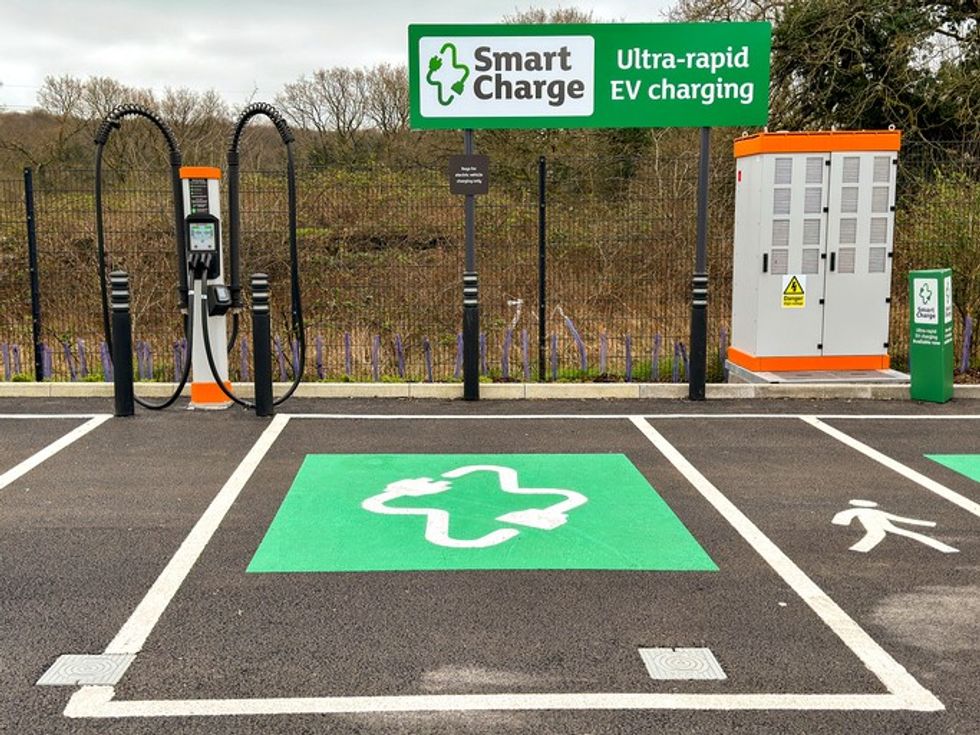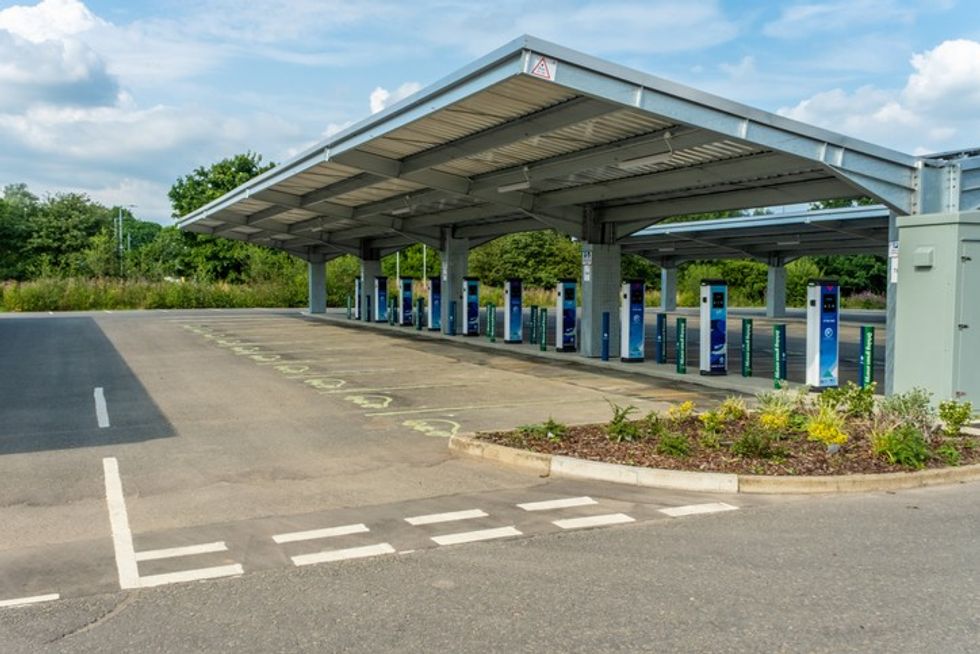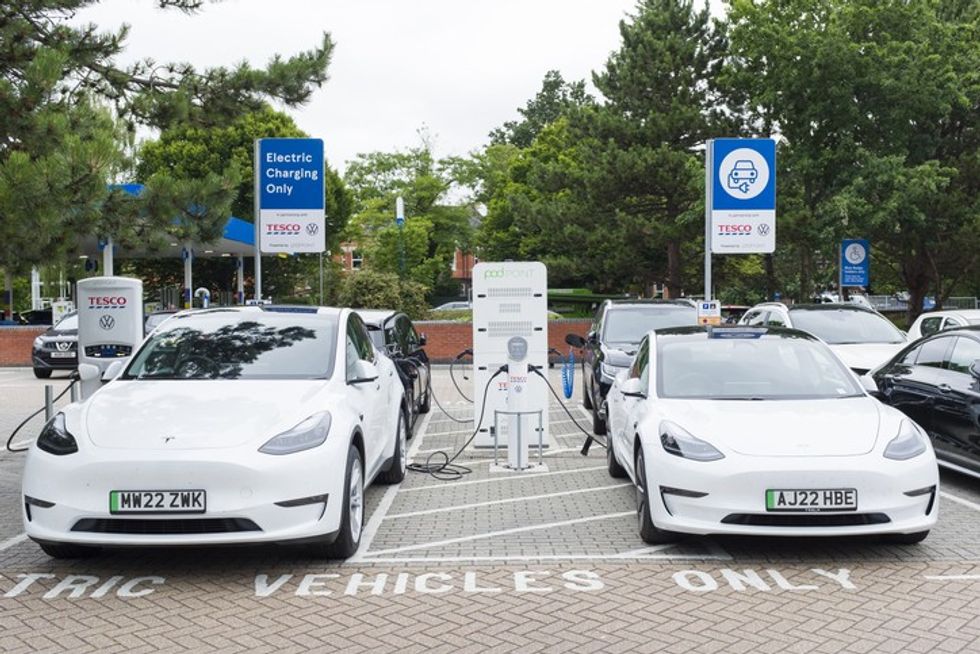With the constantly rising number of electric vehicles (EVs), forecourts have a huge and exciting new sales funnel to tap into, though it's not an easy road ahead, Asian Trader reports.
The EV scene in the UK has been revving up like never before. By the end of February 2024, over 1,000,000 fully electric cars are cruising down UK roads, with an additional 620,000 plug-in hybrids zipping around. This electrifying growth clearly shows that the UK is wholeheartedly embracing the EV revolution.
By 2030, between 8 million and 11 million EVs are expected to roam the country’s roads. The future is electric, and it's already here!
With the rising number of EVs, the charging points are cropping up and are expected to play a crucial role in retail business as well going forward. In 2023, supermarkets across the country collectively added EV chargers to over 600 new locations, meaning drivers can now charge up at more than one-in-10 of their stores, states the figures from Zapmap and the RAC.
The total number of supermarkets offering EV charge points rose by 59 per cent last year – from 1,015 stores with charging facilities in 2022 to 1,616 in 2023. This equates to 13 per cent of all 12,839 UK supermarkets, including those that don’t have parking facilities.
Charger installations also increased by two-thirds (69 per cent) with stores adding 1,195 new charging devices last year. This brought the total number up from 1,721 at the end of December 2022 to 2,916 by the end of 2023.
Within this total, 1,107 units installed were rapid or ultra-rapid, marking a huge increase of 145 per cent from the 451 rapid chargers installed in 2022. Fortunately for end users, this means that over half (55 per cent) of all supermarket EV locations now offer higher-powered charging capabilities.
In the supermarket charging league, Sainsbury’s is taking the leap by gaining the biggest year-on-year growth thanks to the launch of its ultra-rapid network Smart Charge. After installing just 53 units in 2022, the retailer nearly tripled its total device numbers in 2023 by adding 104 new chargers to its stores.
Sainsbury’s also has the highest average number of rapid chargers per location, at four units per store across the 22 shops that provided high-powered charging.
Sainsbury’s is aiming to have over 750 charging bays across over 100 locations by the end of 2024, putting it in the top five providers of ultra-rapid EV charging in the UK. Its new charging hubs are said to be powered by the same electricity that powers the rest of Sainsbury’s estate, which is 100 per cent renewable.
Meanwhile, Tesco is also in this race with the biggest overall supermarket charging network. With 1,305 devices now in place across 4,859 shops, the retailer added 497 chargers to its stores last year.
EV and forecourts
There are 8,380 forecourts across the UK, trading in urban transient locations (40 per cent), residential locations (28 per cent), rural locations (17 per cent), commercial or industrial locations (13 per cent) and motorways (2 per cent), show the figures from local stores body Association of Convenience Stores (ACS).
On UK forecourts, there are currently around 252 electric charging devices located at 158 forecourts in the UK.
Interestingly, going further, it is anticipated that availability of EV charging points is going to play a crucial role in the retail environment as well.
According to Kantar & Virta’s EV Driver Survey 2022, while just a small proportion of UK drivers have so far gone electric, almost half intends to eventually drive a plug-in car. What is noteworthy here is that over 60 per cent of EV drivers in the country consider EV charging as a must-have feature or a key choice factor when deciding where to shop.
Installing an EV charging station comes with its own perks. Nobody is getting rich by selling EV charging alone, but it is the extra dwell time where the real magic happens.
Instead of just refueling, relieving oneself, grabbing a soda and a snack, and then zooming off, EV drivers have to hang around for about 45 minutes or longer if there is a queue. This wait time is a golden opportunity for convenience store operators to offer more premium services, like a cozy café, hot food-to-go, and an enticing array of crisps, snacks, sweets, and other essentials.
The extra dwell time increases the potential of customers spending a bit more as we know each minute counts in retail. The average amount a customer spends in a store per minute is between £0.4 to £.8, according to industry standards. As a result, the financial impact of one charging event on retail business can be up to £ 43.
For convenience stores, the rollout of EV charging stations seems even more promising as it hopes to offset the loss of foot traffic from declining gas and tobacco sales and can also further boost the momentum of grab-and-go food offerings.
In fact, quick-service restaurants and big box stores are also looking to capitalize on EV traffic. Subway, Taco Bell, and Starbucks are some big names that are gearing up in this realm.
The rush was mentioned in the ACS’ most recent Forecourt Report which states that over 8,600 public charging points were added to the UK network.
Releasing the report, ACS chief stated that forecourt retailers will undoubtedly have a role to play in an EV future, but the country is still not seeing a rush for all stores to put in charging points, as for many the “value that a parking space currently provides for a customer who is coming in to shop outstrips the potential value of a charging point on the site”.
It turns out that the transition or even addition here for convenience and forecourts is not so easy breezy.
Caution: Bumpy road ahead
The prospect of having EV charging points on the premises of forecourts or even at the parking lot of a convenience store is bright and tempting. However, it’s not an easy route to take.
Investing in charging is infrastructure is an expensive business. The CMA estimates that the cost of installing rapid and ultra rapid costs upwards of £25,000 apart from other costs like charge point hardware, installation costs as well as grid enforcement as retailers may need to improve the supply to their site.
Clearly, forecourt retailers need support from government to invest in charging infrastructure. Funds and grants, including the Rapid Charging Fund need be brought forward and made accessible to the forecourt sector.
The government’s Rapid Charge Point Strategy and Ten Point Plan was a welcome move as it shows the government’s commitment to improve EV charging infrastructure in the lead up to the 2030 target for the ban on sales of new petrol and diesel vehicles.
However, to achieve the target, fuel retailers will need government support to invest at the scale and speed necessary to deliver an appropriate amount of infrastructure to support and provide EV charging facilities.
ACS has been calling on the government to work with the EV charging sector to ensure consumers have clarity on compatibility of EV charge points. The government should introduce an exemption for electric vehicle charging points and the associated car parking space from the rating list to incentivise investment.
Furthermore, forecourt retailers need to install fast and rapid charging points to meet consumers’ charging needs. This requires direct connections to the National Grid which are not available at fuel retailing sites, implying fuel retailers must invest in new substations at fuel sites to deliver rapid charge points. The cost of installing substations can run to millions of pounds, implying for larger businesses, there are limited prospects to recoup these costs, while this is not feasible for smaller businesses without apt support.
ACS points out that the government are prioritising sectors other than forecourts with investments in EV infrastructure and is missing out on en-route charging opportunities, which could be offered by petrol forecourts and convenience store sites, which are located in every community across the UK.
Despite the endless advantages of EV charging stations for retail, the UK is still way behind in its ambition of having 300,000 charge points by 2030, despite a 36 per cent increase in the last 12 months. The reality remains that currently, there are not enough public charging hubs available to meet demand. Media reports estimate that the government is as much as “20 years behind schedule”.
On the retail side, there remains a great deal of uncertainty about future transport solutions, including hydrogen, making it difficult for fuel retailers to invest. It is afraid that fuel retailers will have to make multiple investments in expensive infrastructure with limited prospects for higher profitability.
Like, MFG has been very bold in its plans for EV charging but its chief executive William Bannister stated in a recent summit that getting the infrastructure in place was a time-consuming business.
Apart from money and infrastructure, there are other barriers too as gaining planning permission and meter installation that can even take up to 12 months, as reported by a few retailers.
Slow and stuttering
In the words of ACS chief executive, EV development is “stuttering, but it’s still the direction of travel”.
A Labour government confirming its policy of bringing the ICE ban back to 2030 might bring some more urgency to the shift to EVs, but there are other factors holding this back regardless of the election result, he said, pointing out cost, range and charging infrastructure as points of concern.
"Forecourts and other potential providers of charging facilities are unable to make the case for these costly investments with so much uncertainty and challenges in accessing adequate power supply.
“But if EV is limping along in second gear, other solutions like Hydrogen are in reverse. That’s not to say they won’t be part of the future, but over the next two decades the story of powering private vehicles is going to be a transition (however imperfect) from oil to electric,” stated ACS chief.
In its recent submission consultation on street works access: electric vehicle charge point operators, ACS once again highlighted the need for more funds for forecourt retailers.
“If the government is to meet its target of 300,000 EV charge points by 2030, forecourt retailers must be supported in investing in infrastructure. This should be achieved both in financial terms and by removing regulatory barriers.
“Government should also focus on other barriers, such as making it easier for retailers to gain access to the grid. A major barrier to investment in EV charging infrastructure is the difficulty in obtaining connection to the national grid. As aforementioned, the cost of reinforcing grid connection can be expensive, and it is also an intensive administrative burden.”
Clearly, cost, infrastructure and other barriers are prohibiting at the moment for small and medium independents to enter the EV charging market. The change is inevitable but whether that change can happen on every other forecourt or convenience site is another story altogether owing to multiple and back-breaking constraints around money, space and the ability to get the electricity supply.









